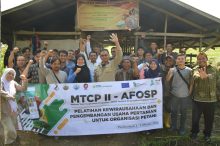PAYAKUMBUH, INDONESIA – AFOSP-MTCP2 Indonesia conducted an agricultural entrepreneurship training for young farmers in the country on 1-4 October 2019 at Padang, Payakumbuh, Indonesia. The training aims to equip young farmers with skills in pioneering entrepreneurship in farmer-led agricultural cooperative in the rural areas.
Aliansi Petani Indonesia (API) (Indonesia Peasant Alliance) together with farmers’ organisations Serikat Petani Indonesia (SPI) (Indonesian Peasant Union), Serikat Nelayan Indonesia (SNI) (Indonesian Fishermen Union), Wahana Masyarakat Tani dan Nelayan Indonesia (WAMTI) (Indonesian Farmers and Fishers Society Organization), and Ikatan Petani Pengendali Hama Terpadu (IPPHTI) (Integrated Pest Management Farmers Association of Indonesia) collaborated under the AFOSP-MTCP2 platform to provide entrepreneurship training for young farmers living in the rural areas of Indonesia. Through this training, young farmers were taught to recognize potential agriculture resources that available around them. Furthermore, after the training, they are expected to develop professional, profitable, and sustainable cooperative enterprise services together with farmers organisations.
In Indonesia, the agricultural activities carried out by majority of small holder farmers in rural areas are mostly reliant and focused only in cultivation. Most farmers also have limited access to land. With these challenges, it is important to increase or add value to the sources of income of farmers by teaching them about input supply service, post-harvest processing, and marketing.
Post-harvest processing and marketing play an important role in agricultural production activities. This sector provides an economic benefit of 50% out of all agricultural activities. Providing service of production input supply such as fertilizer for plant nutrition is composed of 30% of total cost of the agricultural activity, while the cultivation activities only provide 20% economic value. The economic benefits in off-farm are maximized by other parties such as the middlemen, traders, and processing companies.
The use of economic value in the agricultural sector is based on the cooperation between farmers that are stronger and more direct. The development of agricultural entrepreneurship system has more advantages and has a positive impact on improving the welfare of farmers and agricultural business actors in rural areas. The production of highly competitive agricultural products will benefit farmers. The MTCP2 Indonesia platform sees the involvement of young farmers in agricultural cooperatives / entrepreneurship as an important factor to help the agriculture sector achieve higher economic value. ### (Photos by API)
















Comments are closed